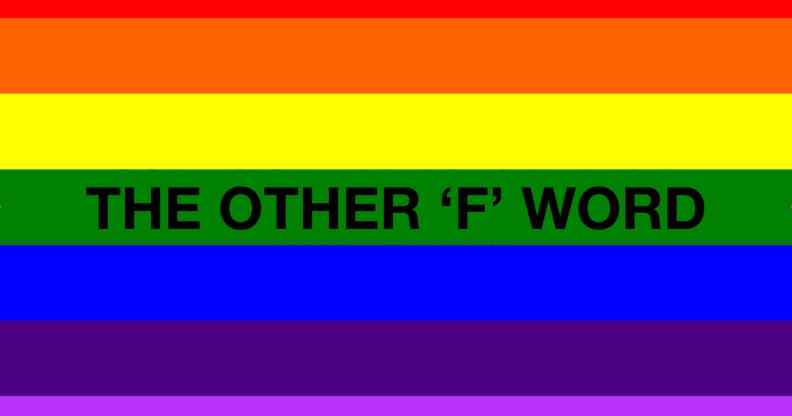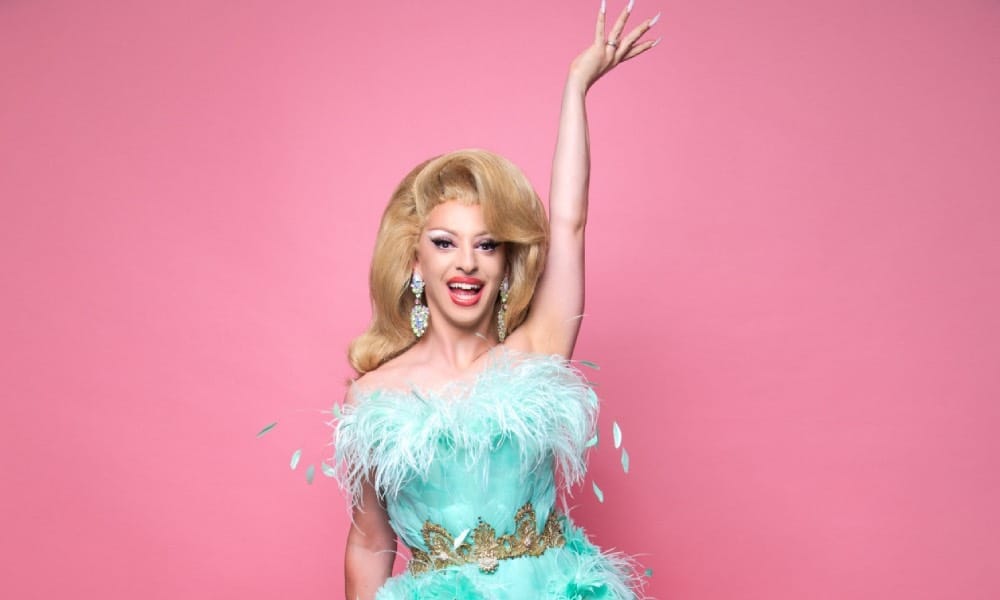Is it ever okay to say the word ‘fag’?

Have you ever been called a gay slur? Be it fag or batty boy, dyke or pansy? Yeah, me too. It can be hurtful, but is it ever okay for LGBT+ people to say these words?
I’m a proud gay man. No word is going to make me feel insecure or ashamed about my sexuality. Recently, a charming gentleman called me a “fag,” completely unprovoked. My response (after a few G&Ts) was, “Yes, can you tell by my fashion? It’s impeccable. I’m assuming you’re not gay?”
This is something that I would never have dreamed of saying before I was comfortable with my queer identity. However, I still felt the anger and hatred coming from the man calling me this derogatory term, and it reminded me of the power and fear the word once had over me.
This made me think of how the LGBT+ community has, in part, reclaimed these words. I hear gay men calling each other fags all the time, as well as lesbians who use the word dyke. There are also terms such as “fag hag,” used to refer to straight female friends of gay men.
I very rarely use the F-word. Although I can understand the power in reclaiming slurs, I instinctively don’t want to normalise any of these words into my vocabulary, regardless of who I am speaking to.
I’ve never had a good relationship with the term. An ex of mine once used the F-word to describe my slightly effeminate gay male friend, and although it was meant in a lighthearted way, it made me feel very uncomfortable and as though I had to hide my own effeminate qualities from him throughout the relationship.
Is it used by gay men to show that we are unashamed of being sword swallowers (a personal favourite of mine), or could it be to appear more masculine, potentially because of their own internalised homophobia?
What does ‘fag’ mean and where did it come from?
The word fag has a very dark, and oppressive history. When gay people were imprisoned, sanctioned and even killed for their sexuality, it pains me to think that the F-word would have been the most common term spat at them during their “punishment”.
Faggot literally means a bundle of sticks, and the word “fag” was used in the 19th Century as an abusive term to describe older women who gathered firewood.
The term has since been used by, well, homophobes, to describe gay men. It shares the same number of letters with the word “gay” and this reinforces my view that any straight person who uses the term to describe a gay man is being purposefully homophobic.
Personally, I don’t want to adopt a homophobic word into my vocabulary, especially when the word “gay” is just as easy to say. But am I being overly sensitive?
I mean, probably. I cry watching Titanic.
Some LGBTQ+ people are reclaiming oppressive and offensive words
I talked to some of my friends about this topic, and the majority told me that I need to lighten up. “Fag” is often used as a term for endearment between gay men, and I can understand why many find using this term playful and empowering.
However, as soon as a straight person drops the F-bomb, this playful mood immediately changes.
I think this further draws a line between us and them, which is something I’d like to avoid when spending time with a group of friends that contains people of various sexualities.
But again, do I need to lighten up?
I took to Twitter to ask some gay men I follow what they think about the topic. One person told me that we should “take back the words, turn them on their head and celebrate them,” and another said, “I use the word to make the word ours. It’s empowering.”
Both of these statements sound completely fair to me, but I feel like any use of the word is like treading on eggshells. If a gay friend called me a fag, I still think it would take me by surprise and potentially trigger my bad memories associated with the word.
LGBT+ YouTuber Calum McSwiggen told me that “if you want to refer to yourself as a fag, if you want to own that, I think that’s great. But I don’t think anyone has the right to use that word to refer to other people.”

This is something I can understand a bit better. Using the word fag to refer to another gay man is potentially problematic as you don’t know their history with the slur.
Perhaps before using the word within our communities, we first need to know how people around us would feel about it.
I talked to one of my favourite drag queens, Miz Cracker, about how she uses the word in her comedy and she highlighted a similar approach.
“I enjoy using it in my comedy because every time I use it, the word loses some of its edge and power. With that said, as a gay comedian, I always do a little test at the beginning of each show to see how the room responds. If I get a sense that the word is getting a negative response, I drop it.”
For me, at the risk of offending or hurting someone, it seems wise to stick to non-derogatory words to refer to other gay men. Unlike Miz Cracker’s audience, I’m not trying to win over my friends. I’m just trying to have fun, and gauging their response to a word seems like a lot of unneeded effort.
Some gay people refer to each other as ‘fags’ online
“He’s holding it like a fag. Pun intended.”
That was the first time I was called a “fag.” I was holding a fake cigarette in a terrible selfie I uploaded onto Facebook (give me a break, we were all 13 and lame once).
The first time the word was hurled at me was a comment under the cringe-worthy photo.
Today, the word is frequently used by gay people online. Whether it be in someone’s Twitter handle or how they refer to another gay person online.
I guess the question is whether it is more okay to type the word than say it.
Social media takes away a person’s face when you’re communicating with them. In this instance, by referring to a person as a “fag” online, you don’t know how they’ve reacted. You don’t know whether they find it as playful as you do.
The tweet or comment is also available for all to see. Again, maybe I’m being super sensitive (as always), but I’d worry that a homophobic person could see the word being used online and, because of that, reinforce their ideology that it’s an acceptable term to use against gay people.
After all, social media takes away most of the responsibility for an individual’s actions. You can never truly access the effect you have on others through your online communication.
Mind you, I have under 250 followers on Twitter… I’m not exactly an expert on how to use the platform.
Is there a comparison to other slurs?
I’m not entirely sure if we can compare the word “fag” to religious or racial slurs because every derogatory term has a different oppressive background to it.
However, something that interests me is how some negative racial terms have been reclaimed, similar to that of the word “fag” for some gay people.
Peter Robinson, a professor of Sociology at Swinburne University, told me that “the usage of these slurs goes to what sociologists call ‘in-group behaviour,’ where some will use derogatory terms as terms of endearment for each other.”
So is there a feeling that the word “fag” could be used by a group of gay men to show a sense of belonging with each other — finding common ground by saying a word only we can say without a large amount of backlash.
Although all these slurs are hate language, I think it is dangerous to compare these different words with each other. Miz Cracker explained to me that “there is a hierarchy in hate language. There are certain racial words that are so destructive, I wouldn’t dare compare their impact to the effect of words like fag or homo.”
Is it just about context?
I refer to many of my friends by using the word “bitch.” They all know that this comes from a place of playfulness, so perhaps the same can apply to the word “fag” based on the tone in which it is spoken?
The endearment and empowering argument for the use of the word is one I can fully understand, and almost even get behind, however, there is still something pulling me back from adding it to my vocabulary.
Maybe it’s my personal association holding me back from embracing it. However, if I were to use the word, I’d say that all the fags I know are incredible, wonderful people.
But I’d much rather refer to them with words that I view as more endearing.

